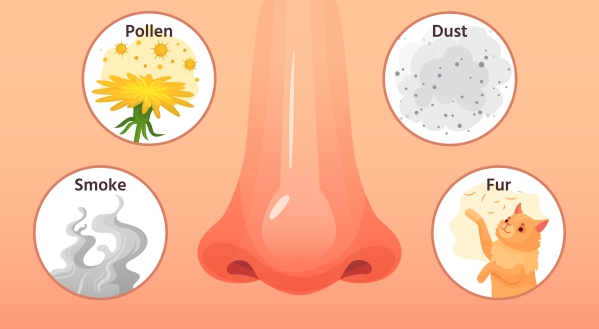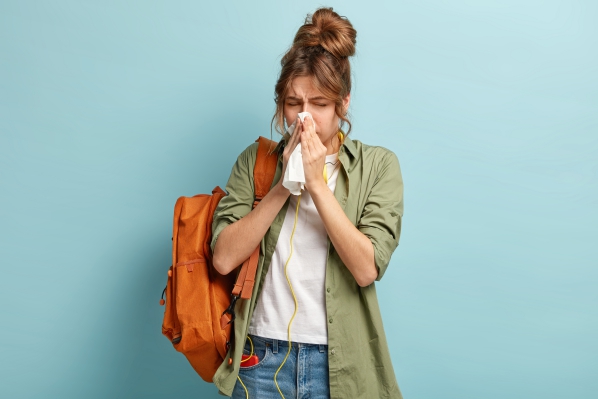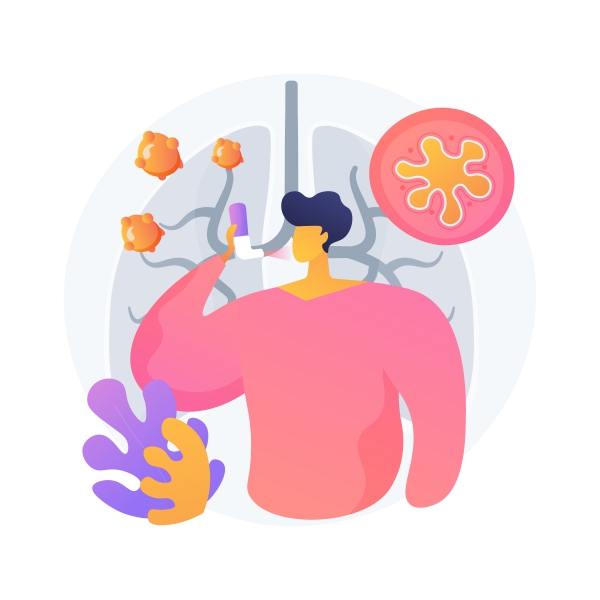What is allergic rhinitis?
Allergic rhinitis, also known as hay fever, is caused by an allergic reaction to allergens (harmless substance that triggers an allergic response) such as dust mites, pollen and animal fur. It causes cold-like symptoms such as runny nose, itchy eyes and sneezing.
According to the National Center for Biotechnology (NCBI), at least 15% of US citizens suffer from allergic rhinitis. In addition, the most common allergen in seasonal hay fever is pollen.
Causes of allergic rhinitis
Allergic rhinitis develops when your immune system perceives harmless particles in the air (allergens) as harmful. Upon identification of these allergens, your body will produce antibodies against them and the next time your immune system encounters the same allergen it will trigger an allergic reaction. This leads to the release of histamine (natural chemical that defends your body against an allergen and has a central role as mediator of itching) into your blood causing the signs and symptoms of allergic rhinitis. Examples of allergens are mould (a type of fungus), animal fur, dust mites, cat saliva and grass pollen.

Risk factors
The list below consist of factors that may increase your risk of developing allergic rhinitis:

- Humidity
- Having other allergies
- Suffering from asthma
- Cold temperatures
- Having a close relative (parent or sibling) with allergies or asthma
- Cigarette smoke
- Suffering from eczema (the most common type being atopic dermatitis)
- Perfumes
- Having a working environment which exposes you to allergens
- Fumes
- Maternal smoking exposure in the first year of life
- Hairspray
- Air pollution
Signs and symptoms of allergic rhinitis
The list below includes the signs and symptoms of allergic rhinitis:
- Runny nose
- Stuffy nose
- Itchy, watery and red eyes
- Cough
- Hives (red and itchy skin)
- Sneezing
- Itchy nose
- Allergic shiners (blue-coloured skin under the eyes)
- Fatigue
- Headache
- Sore throat
If you are frequently exposed to allergens, with time you will experience symptoms even with a lesser amount of allergen. This is because there will be an accumulation of circulating antibodies in our body.
Furthermore, allergic rhinitis is associated with several other conditions such as:
- Allergic conjunctivitis (up to 60% of patients): itchy, watery and red eyes. The symptoms are usually present on both sides.
- Sinusitis: obstruction of the nasal passage can predispose to sinusitis as bacteria can travel to the sinuses (80% of patients will eventually end up with chronic bacterial sinusitis). The symptoms include stuffy and runny nose with yellow discharge, cough and facial pain.
- Asthma: up to 50% of people suffering from asthma also have allergic rhinitis and the symptoms are cough and chest tightness.
- Food allergy: usually after eating uncooked food such as fruits and vegetables, there will be itching of the mouth and throat immediately.

Allergic rhinitis is different from common cold. There is no fever associated with allergic rhinitis and symptoms appear immediately after exposure to the allergen whereas in common cold there is fever and it takes up to 3 days to experience symptoms.
Making a diagnosis
To diagnose allergic rhinitis, your doctor will perform a physical examination and certain tests such as skin prick test and radioallergosorbent test (RAST). The skin prick test is the most common test whereby your doctor places different substances on your skin to see if there is any allergic response and RAST indicates the amount of antibodies (immunoglobulin E) in your bloodstream.
Treatment
Allergic rhinitis can be treated in mainly 2 ways, namely medications and home remedies:
Antihistamines
This group of drugs work by blocking the effects of histamine. Some examples are:
- Diphenhydramine
- Cetirizine
- Loratadine
Decongestants
Decongestant are not to be used for long periods of time as it can cause a rebound effect. This means that as soon as you stop taking the medication, your symptoms will deteriorate. This class of drug includes:

- Phenylephrine
- Cetirizine with pseudoephedrine
- Oxymetazoline
Decongestants are to be used with caution if you have the following conditions:
- Heart problems
- Previous strokes
- Sleep problems and anxiety
- Elevated blood pressure
- Bladder problems
Eye drops and nasal spray
These medications can be used to alleviate your allergy-related symptoms and itchiness. Like decongestants they should not be used for long periods of time as they can cause a rebound effect. For long-term use, you can used steroid nasal spray.
Immunotherapy
Immunotherapy is one where allergy shots are administered to decrease your immune response to particular allergens. It is a long treatment consisting mainly of two phases, namely build-up phase and maintenance phase. The build-up phase is where you go to your doctor’s office for one shot three times per week for three to six months to acclimatise with the shots and the maintenance phase is where you visit your doctor for 1 shot every two to four weeks for three to five years. Eventually, your symptoms will start to disappear. Your doctor will ask you to wait for at least 30 minutes in the office after having your shot as some people can have severe allergic reactions to it.
In addition, there is another immunotherapy technique where instead of shots, you place a mixture of allergens under your tongue. This technique is known as sublingual immunotherapy.

Home remedies
Side effects of medications are major concerns for many people nowadays and that is why more people are looking at ways to treat their allergies “naturally”. Some of them are:
- Nasal saline irrigation
- Butterbur
- HEPA filter: they trap allergens like pollen, animal fur and dusts hence reducing allergens in your home
- Probiotics
- Air conditioner: an alternative to opening windows(prevent allergens from entering your home)
- Honey
- Vitamin C
- Essential oils like eucalyptus, peppermint and frankincence
- Ginger: add ginger to our tea and sipping your tea, inhale the steam coming from your cup. Ginger works as a natural antihistamine and boost your immune system
Complications of allergic rhinitis
Complications of allergic rhinitis includes:
- Recurrent headaches
- Sinusitis
- Frequent ear infections
- Worsening of asthma symptoms
- Lack of sleep as symptoms make it hard for you to stay asleep
- Reduced quality of life
- Absences from work and school
Prevention of allergic rhinitis
It is very difficult to prevent you from having allergic rhinitis. However, the best thing you can do is to avoid exposure to allergens as much as possible. Some way to achieve that is by:

- Covering your mouth and nose while performing yard work using a facemask
- Washing your hands frequently with soap and water
- Bathing your dog regularly
- Washing pillowcases and bed linens in detergent and hot water to remove allergens
- Taking a shower immediately after going outside
Prognosis of allergic rhinitis
Most people can expect an improved quality of life given that appropriate measures are taken, such as medications and environmental control measures. In addition, taking your anti-allergy medications before you are exposed to allergens will greatly play in your favour.

Source:
J. Alastair, I. and Simon, M., 2016. Davidson's Essentials of Medicine. 2nd ed. London: ELSEVIER.
Parveen, K. and Michael, C., 2017. Kumar & Clarks Clinical Medicine. 9th ed. The Netherlands: ELSEVIER.
Kemp, S., 2020. Allergic rhinitis: Clinical manifestations, epidemiology and diagnosis
Kemp., S. 2020. Pharmacotherapy of allergic rhinitis



